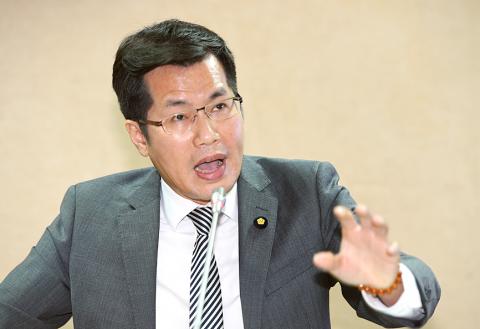Democratic Progressive Party (DPP) legislators have proposed amendments to the Act Governing Relations Between the People of the Taiwan Area and the Mainland Area (臺灣地區與大陸地區人民關係條例) to require former presidents and vice presidents to obtain official approval from the sitting president prior to visiting China.
The amendments were proposed by DPP legislators Lo Chih-cheng (羅致政) and Chen Ting-fei (陳亭妃).
According to the act, all politically appointed former officials with access to national security information are required to obtain approval from the Ministry of the Interior before visiting China in the first three years after their retirement, Lo said.

Photo: Chang Chia-ming, Taipei Times
However, former presidents and vice presidents, who have superiority access to sensitive information, are exempt from the requirements, and “this gap in Taiwan’s national security makes the amendment necessary,” he said.
Chen said the president is the ultimate authority on national defense, diplomacy and cross-strait relations, and there is a need to guard state secrets that flow through the Presidential Office.
The proposed amendments would require former presidents and vice presidents to obtain permission from the sitting president before visiting China and would oblige them to disclose their itinerary and purpose of travel, Chen said.
The proposed measures would protect national security and encourage mutual trust and respect between former and current presidents, Chen added.
Chinese Nationalist Party (KMT) Legislator Alicia Wang (王育敏) opposed the proposed amendments, saying that DPP lawmakers were clearly and improperly targeting President Ma Ying-jeou (馬英九), who is to leave office on May 20.
The proposal lacked “rationality and necessity,” Wang added.
Wang said the proposal undermined the spirit of president-elect Tsai Ing-wen’s (蔡英文) calls for bipartisanship and would create “futile complications” to political cooperation between parties.
Former presidents should be encouraged to contribute to cross-strait relations, and it is “hardly desirable” to limit the ability of “former heads of state” to travel, Wang said.
The incoming administration is unlikely to inherit the KMT government’s good relations with China, and the DPP should consider preserving channels of communication with Beijing, she added.
The DPP should “have more vision” and refrain from taking actions that “solely concern Ma as an individual,” Wang said.

A Ministry of Foreign Affairs official yesterday said that a delegation that visited China for an APEC meeting did not receive any kind of treatment that downgraded Taiwan’s sovereignty. Department of International Organizations Director-General Jonathan Sun (孫儉元) said that he and a group of ministry officials visited Shenzhen, China, to attend the APEC Informal Senior Officials’ Meeting last month. The trip went “smoothly and safely” for all Taiwanese delegates, as the Chinese side arranged the trip in accordance with long-standing practices, Sun said at the ministry’s weekly briefing. The Taiwanese group did not encounter any political suppression, he said. Sun made the remarks when

The Taiwanese passport ranked 33rd in a global listing of passports by convenience this month, rising three places from last month’s ranking, but matching its position in January last year. The Henley Passport Index, an international ranking of passports by the number of designations its holder can travel to without a visa, showed that the Taiwan passport enables holders to travel to 139 countries and territories without a visa. Singapore’s passport was ranked the most powerful with visa-free access to 192 destinations out of 227, according to the index published on Tuesday by UK-based migration investment consultancy firm Henley and Partners. Japan’s and

BROAD AGREEMENT: The two are nearing a trade deal to reduce Taiwan’s tariff to 15% and a commitment for TSMC to build five more fabs, a ‘New York Times’ report said Taiwan and the US have reached a broad consensus on a trade deal, the Executive Yuan’s Office of Trade Negotiations said yesterday, after a report said that Washington is set to reduce Taiwan’s tariff rate to 15 percent. The New York Times on Monday reported that the two nations are nearing a trade deal to reduce Taiwan’s tariff rate to 15 percent and commit Taiwan Semiconductor Manufacturing Co (TSMC, 台積電) to building at least five more facilities in the US. “The agreement, which has been under negotiation for months, is being legally scrubbed and could be announced this month,” the paper said,

MIXED SOURCING: While Taiwan is expanding domestic production, it also sources munitions overseas, as some, like M855 rounds, are cheaper than locally made ones Taiwan and the US plan to jointly produce 155mm artillery shells, as the munition is in high demand due to the Ukraine-Russia war and should be useful in Taiwan’s self-defense, Armaments Bureau Director-General Lieutenant General Lin Wen-hsiang (林文祥) told lawmakers in Taipei yesterday. Lin was responding to questions about Taiwan’s partnership with allies in producing munitions at a meeting of the legislature’s Foreign Affairs and National Defense Committee. Given the intense demand for 155mm artillery shells in Ukraine’s defense against the Russian invasion, and in light of Taiwan’s own defensive needs, Taipei and Washington plan to jointly produce 155mm shells, said Lin,